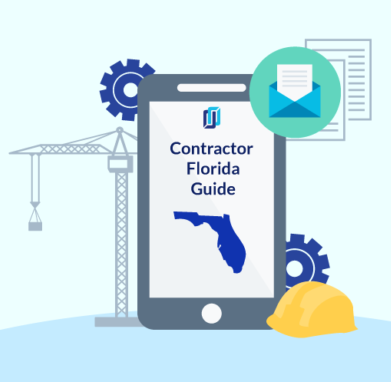
As the Atlantic hurricane season begins and residents of the Eastern and Southern United States prepare for major storms, local governments and consumer protection groups are warning of contractors with improper licensing.
In Florida — where local governments have been preparing for Tropical Storm Elsa’s effects — unlicensed contractors have become a problem: Since January 1, 2021, the Florida Department of Business and Professional Regulation (FDBPR) has received 911 activity complaints regarding unlicensed contractors.
Better Business Bureau consumer expert Bryan Oglesby noted that being prepared for what happens after a storm can be just as important as being prepared for the storm itself, as scams and predatory business actions are prevalent following major weather.
“Unlicensed contractors will come in, usually out of town. Come knocking on your door, asking to do repairs on your home,” Oglesby said.
Often, Oglesby added, unlicensed contractors will ask for upfront payment, but will fail to return to finish the contracted work.
The Better Business Bureau and FDBPR are trying to educate consumers in Florida and other Southern states about these concerns, as it claims the nationwide supply shortage and high construction demand is also causing a possible rise in unlicensed contractors. In the state of Florida, it’s illegal to operate without a license.
“Even though [these contractors] may want to be legitimate and want to do the job, and finish the job, if they don’t have the proper licensing, you as a consumer don’t have the protections in place should something go wrong,” Oglesby added. “Ask to see their license number, and verify it through the state of Florida DBPR at myfloridalicense.com.”
The FDBPR notes that unlicensed contractors could face criminal prosecution and fines up to $10,000 if caught.
Tom Stephens, president of the Better Business Bureau of Northeast Florida, recommended that property owners take steps to ensure that any contractor they work with is legitimate.
“The contractor’s license number is supposed to be on everything he has in print: his business card, his contract,” Stephens noted. “It should really be on his truck. If he’s driving around on a truck without a license number, it makes it suspicious.”

Your Complete Guide to Florida Contractor Licensing
Learn everything you need to know about getting properly licensed and registered as a Florida contractor.
Stephens noted that working with unlicensed contractors puts consumers at significant risk of losing money or ending up with incomplete work.
“The main thing it does is remove you from any chance of getting any funds from the construction recovery fund, which was put in place if the contractor screws things up,” he said. “They pay into that, their license supports the construction recovery fund.”
Contracts should be closely looked at by consumers, as well. “They are complicated contracts written by attorneys, designed to protect their clients in all situations,” Stephens added.
Advice from FEMA offers similar warnings and perspective for other Southern states
These issues don’t only apply to Florida — the same risks can be prevalent in any area that’s affected by hurricane season, the Federal Emergency Management Agency (FEMA) and the Louisiana Governor’s Office of Homeland Security and Emergency Preparedness noted in a recent release.
As demand is so high around the country outside of storm-related construction, FEMA is making it a point to educate consumers of the possibilities of scams: “If an offer sounds too good to be true, it should be questioned. Demand for contractors to repair or replace damaged homes…is high. Fake or unlicensed contractors may try to take advantage of the situation to scam disaster survivors.”
“Attempts to scam residents can be made over the phone, by mail or email, through the internet or in person. It is important to remain alert. Con artists are creative and resourceful,” the release said.
The large number of organizations that can be involved in storm and disaster recovery can help consumers to vet options, but FEMA notes that any influx of money is reason to do this.
“As insurance settlements, grants and loans put homeowners in a position to pay for work on their homes, survivors need to be sure the people they hire are authorized to do the work, will complete it and will do a good job. Out-of-town scam artists may be the first to arrive at your front door after a disaster.”
The Better Business Bureau also notes that local, properly licensed contractors should be aware of “storm chasers who offer to pay local construction companies substantial amounts of money to use the business’s established name, reputation, and phone.”
The nonprofit organization added that these people often “masquerade as a local business, collect the insurance money and then move on, leaving the real business to deal with unsatisfied customers due to bad workmanship, unfinished work, or unfulfilled warranties.”
Contractor licensing rules in Florida protect against these risks
Levelset’s Tom Scalisi notes that the requirements for doing construction work in Florida are detailed and come with serious penalties if not followed.
“In the state of Florida, almost all contractors need to carry a license. Licensing falls under two categories: registered and certified. Registered contractors can work in specific, local jurisdictions. Certified contractors can work through the state,” said Scalisi.
Some services are not necessarily included in contractor licensing, as handyman services often don’t need a license. Regardless of the contract amount, “As long as you’re not working on a foundation, structural walls, plumbing, electrical, asbestos abatement, or other tasks that require licensing,” all that’s needed is a business license.
Read more: 20 Types of Contractor in Construction
A July 2020 statute change made it easier for out-of-state contractors to obtain a Florida contractor’s license, as well — a change that affects many building contractors, HVAC contractors, pool contractors, electrical contractors, and plumbing contractors that may be involved in repairs or cleanup following a major storm.
As Scalisi notes, penalties for unlicensed contractors are significant. First offenses are first-degree misdemeanors that could lead to up to a year of jail or probation, but further offenses could lead to felony charges which come attached to maximum jail sentences of five years and civil penalties up to $10,000.
In addition to these risks, Scalisi adds that “working without a license on a project where one is a requirement will also forfeit your Florida mechanics lien rights…In some cases, you might even owe the customer three times the contract value if your work was defective.”
Read the ultimate guide to proper contractor licensing in every state.